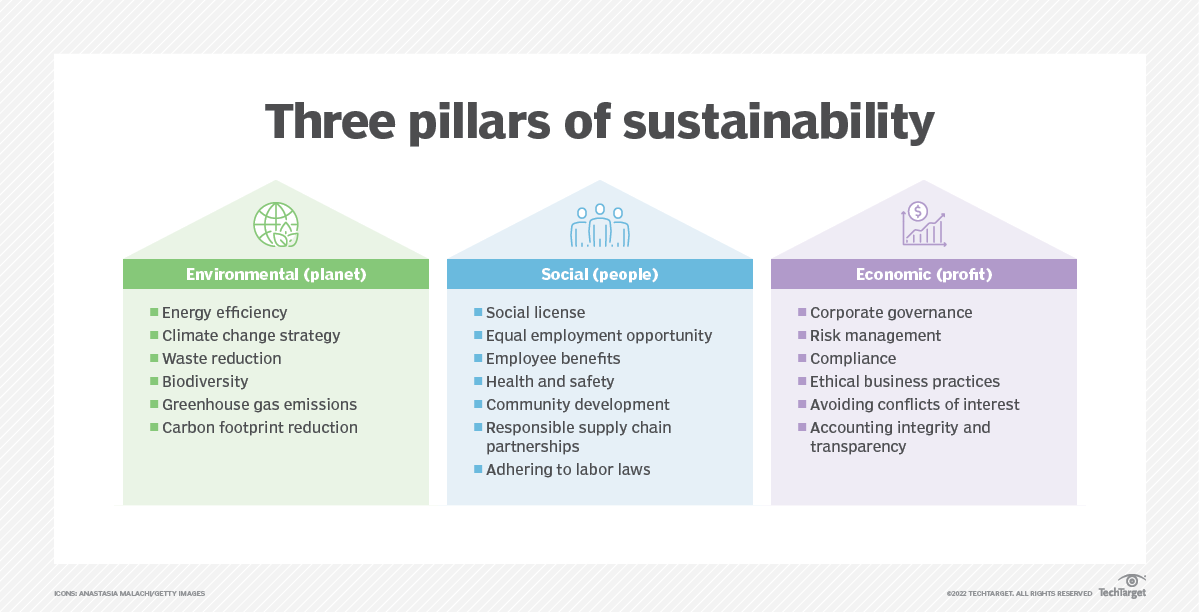What is sustainability in business and why is it more important now than ever?
Companies must consider the environmental and social impacts of their operations if they want to remain successful and competitive over time. From reducing waste to utilizing renewable energy sources, sustainability in business can help organizations achieve cost savings while also protecting natural resources for future generations.
In this blog post, we’ll explore what is sustainability in business, outline strategies for achieving sustainable goals, and identify challenges associated with implementing these practices.
Table of Contents
What is Sustainability in Business?
Sustainability in business is the practice of creating and maintaining a balance between economic growth, environmental protection, and social responsibility.
It involves making decisions that are both profitable and ethical while taking into account the long-term impacts on society and the environment. This includes:
- Reducing waste.
- Conserving resources.
- Minimizing emissions.
- Improving energy efficiency.
- Developing renewable sources of energy.
- Investing in green technologies and practices such as recycling or composting programs.
Sustainability also means considering how a company’s operations affect its employees by providing fair wages and safe working conditions.
Businesses must be aware of their impact on all stakeholders – customers, suppliers, and investors – to ensure they remain competitive in today’s global economy.
Companies can demonstrate their commitment to sustainability through the following initiatives:
- Corporate social responsibility (CSR) programs focused on issues such as poverty alleviation or human rights protection.
- Implement policies for sustainable procurement.
- Set goals for carbon reduction.
- Engage with local communities to promote environmental stewardship.
- Use renewable materials when possible.
- Invest in clean technology solutions.
- Encourage employee volunteerism or other forms of community engagement.
- Offer incentives for eco-friendly behavior among staff members.
Sustainable businesses have an advantage over traditional companies because they understand the importance of protecting our planet’s resources while still achieving financial success. They recognize that being socially responsible can lead to improved customer loyalty and increased profits due to resource conservation efforts.
Additionally, sustainable businesses often receive positive media attention which further boosts brand recognition leading to higher sales figures down the line.
Environmental Sustainability
Environmental sustainability is the practice of creating and maintaining a healthy environment. This includes reducing waste, conserving natural resources, minimizing pollution, and promoting renewable energy sources.
Companies can reduce their environmental impact by investing in green technology such as solar panels or wind turbines, using recycled materials to create products, and developing eco-friendly packaging solutions.
For example, many companies are now transitioning to reusable containers instead of single-use plastics.
Social Sustainability
Social sustainability is the practice of creating and maintaining social value over time. This includes providing fair wages for employees, offering safe working conditions, respecting human rights, and supporting local communities through charity or volunteer work.
Companies can demonstrate their commitment to social responsibility by ensuring that all workers have access to health care benefits, implementing diversity initiatives within the workplace, and engaging with customers about climate change or poverty alleviation.
Economic Sustainability
Economic sustainability is the practice of creating and maintaining economic stability over time. This includes increasing profits while also managing costs effectively so that businesses remain profitable in both good times and bad times.
Companies can ensure economic sustainability by:
- Diversifying revenue streams.
- Investing in research and development.
- Leveraging new technologies like artificial intelligence (AI) or machine learning (ML).
- Expanding into new markets.
- Pursuing strategic partnerships with other organizations.
- Launching innovative products/services that meet customer needs more efficiently than existing offerings do.
Benefits of Sustainable Business Practices
Sustainable business practices can provide a range of benefits to companies, from cost savings to improved brand image.
Cost Savings
Sustainable business practices often lead to cost savings for businesses. For example, investing in renewable energy sources such as solar or wind power can reduce energy costs over time.
Additionally, reducing waste and increasing efficiency through sustainable initiatives like recycling programs or water conservation measures can help lower operational expenses.
Improved Reputation and Brand Image
Companies that demonstrate a commitment to sustainability often experience an increase in customer loyalty due to their positive environmental impact. This is especially true for companies that are transparent about their sustainability efforts.
Consumers are increasingly looking for brands that prioritize social responsibility and ethical standards when making purchasing decisions, so being eco-friendly can be beneficial for building trust with customers and improving your overall brand image.
Increased Employee Engagement and Productivity
Implementing sustainable business practices also has the potential to improve employee engagement levels by creating a sense of purpose.
Furthermore, introducing green initiatives into workplaces may lead to increased productivity since it creates an atmosphere where employees feel motivated by their work rather than burdened by it.
Strategies for Achieving Sustainable Business Goals
Reduce Waste and Increase Efficiency
Companies can achieve their sustainability goals by reducing waste and increasing efficiency. For example, a company could install LED lighting systems that are more efficient than traditional incandescent bulbs or replace paper products with digital alternatives to reduce paper waste.
Additionally, companies should strive to use resources responsibly by recycling materials whenever possible.
Invest in Renewable Energy Sources
Investing in renewable energy sources is an important step for businesses looking to become more sustainable. By utilizing clean energy sources like solar or wind power instead of fossil fuels, companies can significantly reduce their carbon footprint while also saving money on electricity costs.
Furthermore, many governments offer incentives for businesses that invest in renewable energy sources which can help offset the initial cost of installation.
Source Sustainable Materials from Ethical Suppliers
Companies should also look for ways to incorporate sustainable materials into their products and services wherever possible. This includes using recycled materials when available, as well as sourcing from suppliers who practice ethical labor practices and have low environmental impacts throughout the supply chain process.
Additionally, companies should consider how they package their products – opting for recyclable packaging options where feasible. Repair equipment that breaks down instead of replacing them.
 (Source)
(Source)
What is Sustainability in Business: 3 Major Challenges
While implementing sustainable business practices has many benefits, there are many challenges that companies face when attempting to become more sustainable.
High Initial Investment Costs
One of the biggest obstacles for businesses looking to implement sustainability initiatives is the high upfront costs. Many green technologies require large investments which can be difficult for smaller companies or those just starting out.
Additionally, some projects may not have an immediate return on investment (ROI) which can further discourage businesses from investing in them.
Lack of Knowledge or Resources
Another challenge faced by companies trying to become more sustainable is a lack of knowledge or resources needed to make changes happen. For example, some organizations may not have access to experts who understand how best to reduce their carbon footprint or what type of renewable energy sources would work best for their needs. Without this information, it can be hard for companies to know where they should start.
Difficult to Measure Results
Finally, another challenge faced by businesses is measuring the impact of their sustainability efforts on the company, the environment, and society as a whole. This can be especially true if a company has invested heavily in green technology but cannot accurately measure its effects due to a lack of data.
Examples of Companies with Successful Sustainable Business Models
Patagonia is a clothing company that has made sustainability a priority. They have committed to using organic cotton, recycled materials, and low-impact dyes in their products. Patagonia also works with local communities to reduce the environmental impact of their operations and provides grants for grassroots environmental organizations around the world.
Tesla is an automotive company focused on developing electric vehicles. Tesla’s mission is to accelerate the transition from fossil fuels to sustainable energy sources such as solar power and battery storage technology. Tesla has invested heavily in research and development of renewable energy technologies which they use in their cars, homes, factories, offices, and charging stations.
Unilever is a consumer goods company dedicated to reducing its carbon footprint through sustainable business practices. These include investing in wind turbines or solar panels, incorporating sustainable materials into their products, implementing water efficiency initiatives, and committing to zero waste production processes. Furthermore, Unilever partners with suppliers who share their commitment to sustainability by encouraging them to adopt more eco-friendly practices throughout their supply chain operations.
These companies demonstrate that sustainability can be an integral part of a successful business model, and many other businesses have made similar commitments to the environment.
FAQs About What Is Sustainability in Business
What does sustainability mean in business?
Business sustainability is the practice of maintaining business practices that foster long-term success. This is done by considering an organization’s impact on its environment, society, and economy.
What is a simple definition of sustainability?
Sustainable development involves meeting the needs of the current generation without jeopardizing those of future ones while balancing economic, environmental, and social factors.
What is an example of sustainability in business?
Find a company that uses only recycled products to print and mail all of your business materials. By working with another company that shares your commitment to being environmentally friendly, you help save paper and contribute to the culture of your company.
Why is sustainability important in a business?
You can make more profit and increase your revenue by implementing more environmentally friendly business practices. Lowering expenses, finding more innovative ways to be green, improving your brand’s reputation, and attracting more customers who are interested in your environmental practices can all help increase how much money you earn.
Conclusion
So what is sustainability in business and why is it important?
By implementing strategies for achieving sustainable goals, companies can reduce their environmental footprint while also creating long-term economic value. Although there are challenges associated with transitioning to more sustainable models of doing business, many successful companies have already made this shift and serve as examples for others who want to follow suit.
Businesses have a responsibility to reduce their environmental impact and strive for sustainability. It is essential that companies commit to reducing waste, conserving energy, promoting renewable resources, and improving efficiency in production processes.
Making the shift towards sustainable business practices will ensure long-term success while helping protect our planet’s future. Let us all come together now as responsible members of society by taking proactive steps to move towards more environmentally conscious operations within our businesses!
{“@context”:”https:\/\/schema.org”,”@type”:”FAQPage”,”mainEntity”:[{“@type”:”Question”,”name”:”What does sustainability mean in business?”,”acceptedAnswer”:{“@type”:”Answer”,”text”:”
Business sustainability is the practice of maintaining business practices that foster long-term success. This is done by considering an organization\u2019s impact on its environment, society, and economy. “}},{“@type”:”Question”,”name”:”What is a simple definition of sustainability?”,”acceptedAnswer”:{“@type”:”Answer”,”text”:”
Sustainable development involves meeting the needs of the current generation without jeopardizing those of future ones while balancing economic, environmental, and social factors. “}},{“@type”:”Question”,”name”:”What is an example of sustainability in business?”,”acceptedAnswer”:{“@type”:”Answer”,”text”:”
Find a company that uses only recycled products to print and mail all of your business materials. By working with another company that shares your commitment to being environmentally friendly, you help save paper and contribute to the culture of your company. “}},{“@type”:”Question”,”name”:”Why is sustainability important in a business?”,”acceptedAnswer”:{“@type”:”Answer”,”text”:”
You can make more profit and increase your revenue by implementing more environmentally friendly business practices. Lowering expenses, finding more innovative ways to be green, improving your brand\u2019s reputation, and attracting more customers who are interested in your environmental practices can all help increase how much money you earn. “}}]}





